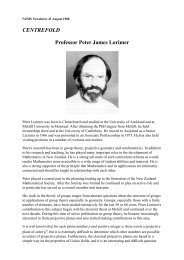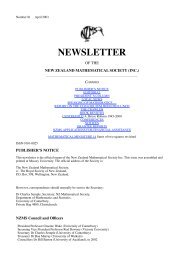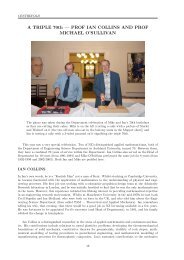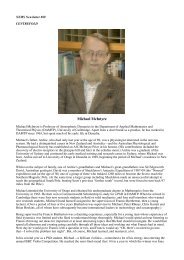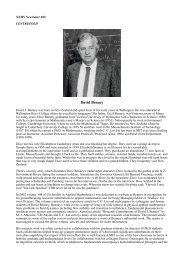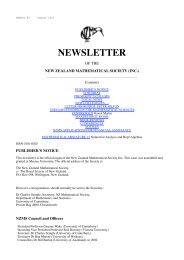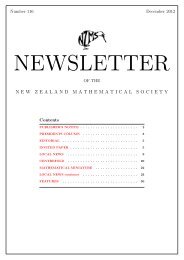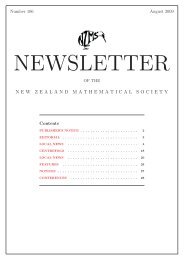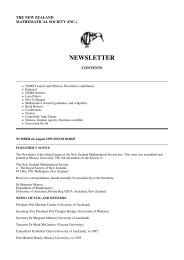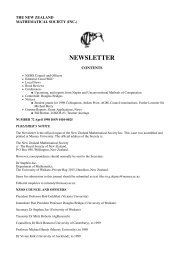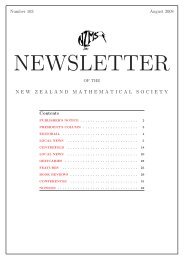John Fauvel - New Zealand Mathematical Society
John Fauvel - New Zealand Mathematical Society
John Fauvel - New Zealand Mathematical Society
You also want an ePaper? Increase the reach of your titles
YUMPU automatically turns print PDFs into web optimized ePapers that Google loves.
NZMS <strong>New</strong>sletter #73<br />
Centrefold<br />
<strong>John</strong> <strong>Fauvel</strong><br />
This year’s <strong>New</strong> <strong>Zealand</strong> <strong>Mathematical</strong> <strong>Society</strong> Visiting Lecturer, <strong>John</strong> <strong>Fauvel</strong>, is a historian of mathematics<br />
from the Open University in the UK.<br />
He will arrive in Auckland on 26 September, and spend the next three weeks touring through the<br />
universities in a southerly direction.<br />
The Open University teaches students who are studying part-time, from home, and has built up a strong<br />
reputation for the quality of its teaching materials designed to be studied at a distance. <strong>John</strong> brings on his<br />
visit to <strong>New</strong> <strong>Zealand</strong> a great enthusiasm for mathematics education at all levels, and the use of history of<br />
mathematics within that teaching and learning process. This is the first time that the <strong>New</strong> <strong>Zealand</strong><br />
<strong>Mathematical</strong> <strong>Society</strong> Visiting Lecturer has been a specialist in the history of mathematics.<br />
A Scot, born in Glasgow, <strong>John</strong> was educated in mathematics at the universities of Essex and Warwick<br />
before joining the Open University to help in an area which the University (then in its early years) was<br />
seeking to develop, the history of mathematics. Since then he has worked on mathematics as well as<br />
interdisciplinary courses. It was for an Open University course on the history of mathematics that <strong>John</strong><br />
produced, with his OU colleague Jeremy Gray, one of the leading source-books in the field, “The history of<br />
mathematics: a reader” (Macmillan 1987).<br />
Other books he has worked on include “Let <strong>New</strong>ton be!” and “Möbius and his band” (both Oxford University<br />
Press) and recently a collection of papers on using history in the mathematics classroom and lecture<br />
theatre called “Learn from the Masters!” (a quotation from Niels Henrik Abel), published by The<br />
<strong>Mathematical</strong> Association of America in 1995. Currently he is working on a history of mathematics at the<br />
University of Oxford over the past 800 years, and this is the subject of one of <strong>John</strong>’s talks in <strong>New</strong> <strong>Zealand</strong><br />
about how different Oxford professors (in particular, <strong>John</strong> Wallis in the 17th century, J J Sylvester in the<br />
19th century, and G H Hardy earlier this century) tackled in rather constrasting ways the issues of<br />
promoting research activity and building up the research strengths and reputation of the University while<br />
sustaining undergraduate teaching.<br />
<strong>John</strong>’s last visit to <strong>New</strong> <strong>Zealand</strong>, in 1995, was to make some films for the Open University’s foundation<br />
mathematics course, having returned from an earlier visit to insist to his UK colleagues that every possible<br />
way in which mathematical modelling is used to understand the world can be found in <strong>New</strong> <strong>Zealand</strong>! The
films include the modelling work of Colin Fox (University of Auckland), David Fletcher (University of<br />
Otago), and Dion Burns (University of Otago), an interview with statistician Wiremu Solomon (University of<br />
Auckland), and include, too, the 1858 Maori arithmetic which <strong>John</strong> found in the Auckland Public Library on<br />
his previous visit, thanks to the help of <strong>New</strong> <strong>Zealand</strong>’s historian-in-residence Garry Tee and Auckland<br />
mathematics educator Bill Barton.<br />
<strong>John</strong> is a former President of the British <strong>Society</strong> for the History of Mathematics, a world-wide organisation<br />
(with several NZ members) despite its name, and has also served on the Executive<br />
Committee of the International Commission for the History of Mathematics. Another body through which<br />
<strong>John</strong> has been working is the International Study Group on the Relations between History and Pedagogy of<br />
Mathematics, and he has recently taken the role of co-chairing an international study on “The role of the<br />
history of mathematics in the teaching and learning of mathematics” which is due to be delivered to the<br />
International Congress of Mathematics Education in Tokyo in 2000. (A subsequent study in the same<br />
series, on “Teaching and learning mathematics at university level”, is currently in progress, chaired by<br />
Derek Holton of the University of Otago.)<br />
In his forthcoming lecture tour of <strong>New</strong> <strong>Zealand</strong>, <strong>John</strong> will talk about ways in which historical resources and<br />
insights can be drawn upon to strengthen mathematics education at all levels, as well as sharing some of<br />
the results of his recent historical researches. One of his proposed talks, for example, will explore the roots<br />
of a fashionable modern concern such as chaos theory in traditions of problem-solving going back four<br />
thousand years, in a line stretching through <strong>New</strong>ton (and his youngr colleague Joseph Raphson) back to<br />
north African engineers and Babylonian scribes.<br />
Another of <strong>John</strong>’s talks reflects on the historical fact that some of the most productive and insightful<br />
mathematicians, from <strong>John</strong> Walls and Isaac <strong>New</strong>ton to Andrew Weil (who died recently), have been those<br />
who paid most attention to the history of the subject. <strong>John</strong>’s broader educational claim is that one purpose<br />
of history is to help us understand present situations better, and that history of mathematics provides a<br />
means of pulling traditions together and avoiding further cultural fragmentation.<br />
Mike Hendy



